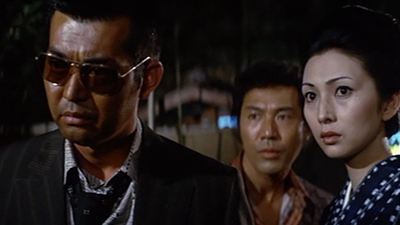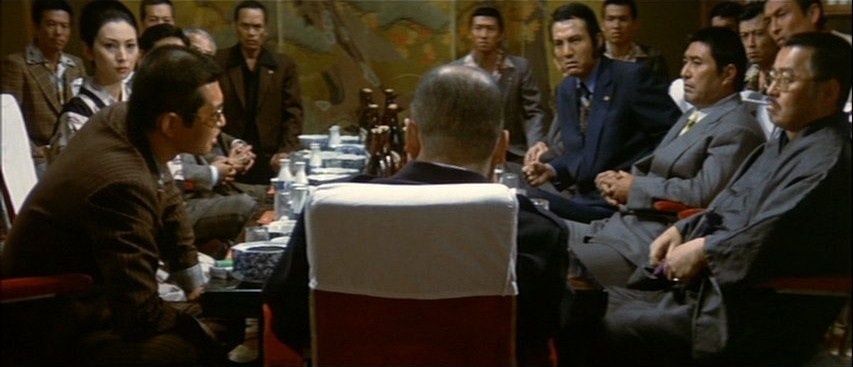
Written by Richard Durrance on 16 May 2023
Distributor Radiance Films • Certificate 15 • Price £16.99
Some minutes after I slid the review copy of Yakuza Graveyard kindly dispatched by Radiance Films into the player (I mean it, the first one went AWOL in the post), a number of thoughts drifted through my mind about the director Kinji Fukasaku and Yakuza Graveyard itself.
I’d just finished rewatching the director’s first five film series Battles without Honour and Humanity, and...
For the first time I’d caught Cops vs Thugs and Graveyard of Honour, just weeks before and these were arguably the best films by Fukasaku I’d yet seen - really a cut above.
Then there was the film’s star, Tetsuya Watari, who was superb in Graveyard of Honour. Moreover, Watari had been part of one of my formative moments of Japanese cinema, where my friend, then my Media Studies teacher, showed us the opening of Seijun Suzuki’s Tokyo Drifter, where Watari’s character refuses to fight. During this scene, the bleached colour gives way to the pop-art colouring of the gun by the train track, and whatever you do, don’t make Watari’s character ask you to stop provoking him again... It's all so fresh in my memory decades later.
I recalled a friend buying an early double-set of Fukasaku’s films, I forget which, both of which suffered from a terrible print, like someone had filmed them through a veil making them almost unwatchable.
Finally, of course, for many of my generation our first introduction to Fukasaku was the last film directed solely by the man himself. I recall sitting in the cinema with no idea what was about to hit my friends and I - the seminal Battle Royale. The experience was so raw and visceral that we had no idea that this wasn't a film by some young-gun director.
Though my knowledge of Fukasaku’s films is hardly encyclopaedic, it felt like I had so many connections to Yakuza Graveyard despite the fact that I'd barely watched ten minutes. And this was ignoring that Radiance’s first Japanese film release was Big Time Gambling Boss, a true gem of a film, deserving of more renown and respect.
Anyway, I guess I better get more into Yakuza Graveyard, isn’t that what you are here for? You better be.
The Nishida family controls gambling in the city, but the more powerful Yamashiro family are moving in. Between these factions stand the police, who want to shut down a war before it starts. Yet there is one policeman, Kuroiwa (Tetsuya Watari), a loose cannon, whose behaviour threatens backroom schemes, becomes sweet on the holder of the Nishida family purse-strings, Keiko (Meiko Kaji), and unexpectedly finds himself a sworn brother to a Nishida yakuza, Iwata (Tatsuo Umemiya); then as the Yamashiro family and police close in, a war of politics, violence and corruption ensues that blur more lines between law, order and violence than a mere mortal can hope to follow.
A little like Battles without Honour and Humanity, at times the internecine story can be hard to follow, but the best thing to do is not get hung up on that because really what you need to be paying attention to is very straightforward; rather than focussing on the narrative goings-on, it’s better to lose yourself in the more intriguing elements of the film.
Because if you slavishly follow the story, you miss out the aspects that really matter. Though first it’s worth thinking about Fukasaku as a visual director, because having just watched his Battles without Honour and Humanity in six days (it would have been five for a throat infection), it’s clear just how this film has his visual fingerprints all over it: the violent sequences that are disorientating, the camera moving (apparently) chaotically but in doing so speaks to the frenzied, explosive and disorientating nature of yakuza violence. This is not structured "aim and shoot" but often off-the-cuff, where there is always a sense of terror and the terrified.
Oftentimes the killer is the most terrified of all, with most acts either inarticulate swings of blades or guns shot as if punching; this all punctuated by occasionally precise, violent, bloody acts. Then there is the quietly, almost unobtrusively disorientating camera angles, often used in the most straightforward of scenes, to show us how what we are seeing is not so on the surface as we may think: police officers talking policy or strategy yes, but really there is something else going on here and the camera’s framing illustrates this.
Then there are the more contemplative moments, the camera more a witness, the pacing slower. It’s worth considering how Fukasaku does this because in all the films I’ve seen by the director, he manages to change pace and angle to make scenes work because he can be formal or almost cinema verité, always appropriate to what we see. Then there is his trademark battles, cutting between still images with a voiceover to move the plot forward, something that can sound lazy but really is anything but - it recognises there is a greater story going on and contextualises it without slowing down the narrative action. Let us not forget, too, his use of colour, saturation or reduction to monochrome, to highlight key scenes or separate past from present.

The camera stops us realising just who is scheming here...
And does the story matter? Arguably the characters matter so much more, as the story is a vehicle to explore them, with Watari’s policeman Kuroiwa seemingly more yakuza than most of the yakuza we meet. Confident, violent, playing by a unique code of ethics, yes Kuroiwa feels very much at home in the yakuza life despite his formal occupation, but he has much in common with Iwata both historically and in the present day, so though at first it may seem the two men are oil and water, apparently hating each other, in John Ford fashion, they find kinship after a brawl. Though, really, they come together because the other is straightforward in their values, while all around them is corrupt politicking; they are honest in their values even if they might be violent in their actions. In fact, it's when the two men come to see themselves reflected in the other when the film really takes off, because you can see the story starting to pay off and the characters have the shine of realness to them. When Kuroiwa tries to get two of Iwata’s men arrested then allows them later to go free, Kuroiwa sees in these two young delinquents a part of himself and we can feel the complex set of emotions that Kuroiwa is feeling even if we rarely see it. There is a richness and realness in the moment that Iwata walks into the room where Kuroiwa is sleeping, right after their fight that could lead to death, but rather than throwing a knife he throws him a bottle and you know instinctively that these two men have met in the middle. It’s a simple scene but it evokes how each recognises in the other that it doesn’t matter if one represents the law, the other the criminal, both are honest outsiders in their own way.
This is also reflected in Kuroiwa's developing relationship with Keiko, who also happens to be married to the jailed Nishida boss. She is also an outsider, and all three are plotted against by exterior forces. Yet if we root for anyone it is Kuroiwa, Iwata and Keiko. There are other aspects too, intriguingly coming into play as I’d just watched GO, the Third Window release coming up, which deals with Koreans in Japan being outsiders and the film touches on this more rarely spoken of outsider status. It’s not just yakuza as societal outsider, or yakuza as outlaw against the police, but these are people whose racial background haunts them through all their pasts as well as their current relationships. Side characters, too, are often given unusual depth, in particular one of Iwata’s young gang members, and again this unexpected detail adds to the sense reality; many of the relationships are complex and surprising, as are most in real life.
And the police? Well, considering that Nobuo Kaneko plays the chief, Akama, who was the scheming Yamamori in Battles Without Honour and Humanity, well, you know the police are about as honest as the yakuza, with everyone pursuing their own agenda. So these three honest protagonists are always going up against a world that has no use for them outside tightly constrained borders and their time is fast running out.
So, should you watch Yakuza Graveyard? Absolutely. Is it quite as good as Fukasaku’s best work I’ve seen to date? That is a tough question to answer because mood when you watch a film is everything and some films need time to digest. But there is an edge to Yakuza Graveyard that is undeniable, like there is to Cops vs Thugs. Watari gives a performance that is so totally opposite to the first film I saw him in all those years ago, yet it is one that is wonderfully assured and is perhaps best illustrated in the beginning of the film, where he flickers between a casually relaxed yet intense performance that shows his range. Meiko Kaji is, well, Meiko Kaji, and like in Hiroshima Death Match, this might not be a Meiko Kaji performance on the scale of Female Prisoner 701 Scorpion: Jailhouse 41 but then her role is often a supporting one. Here, her character has more depth than expected in such a male-centric film, though her screen time is more limited than Tatsuo Umemiya’s appropriately bullish Iwata.
So again, should you watch Yakuza Graveyard?
Yes, because there was so much as I watching the film I wanted to say and likely missed. Sometimes I find myself wanting to give a running audio commentary, provide instream annotation, as so much was going through my mind as I watched Yakuza Graveyard and I didn’t want to miss describing my thoughts. Any such commentary would be superfluous, as better you discover (or rediscover) Yakuza Graveyard for yourself.

Long-time anime dilettante and general lover of cinema. Obsessive re-watcher of 'stuff'. Has issues with dubs. Will go off on tangents about other things that no one else cares about but is sadly passionate about. (Also, parentheses come as standard.) Looks curiously like Jo Shishido, hamster cheeks and all.
posted by Richard Durrance on 07 May 2025
posted by Richard Durrance on 30 Apr 2025
posted by Richard Durrance on 28 Mar 2025
posted by Richard Durrance on 20 Mar 2025
posted by Richard Durrance on 19 Mar 2025
posted by Richard Durrance on 06 Mar 2025
posted by Richard Durrance on 04 Mar 2025
posted by Richard Durrance on 03 Mar 2025